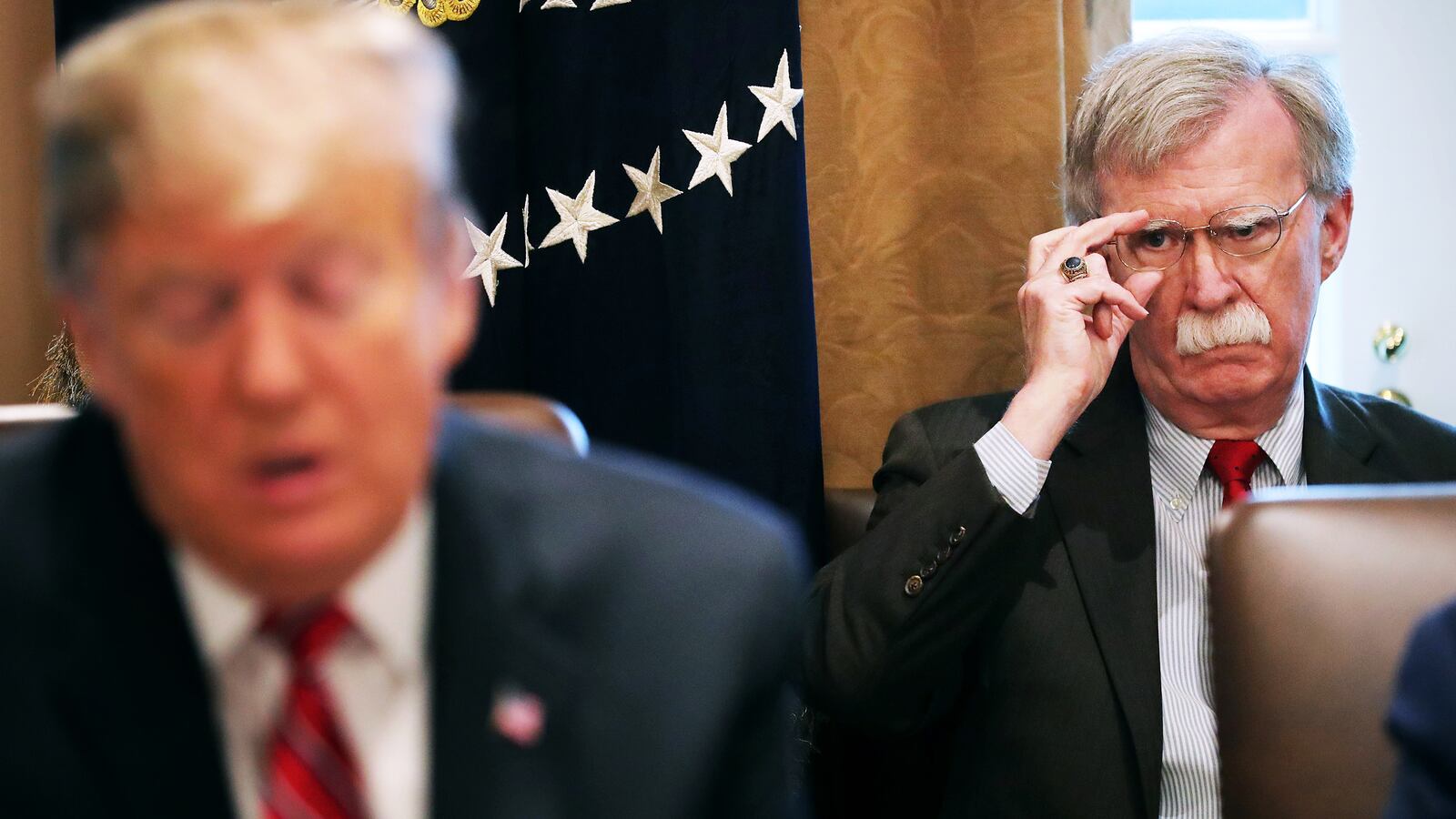In the middle of the night on October 23, 1983, White House operators started calling National Security Council staffers with the news that a yellow Mercedes truck weighed down with explosives and gas canisters had detonated at the Beirut Airport where U.S. Marines were trying to bring peace to the Lebanon’s long civil war. As casualty reports poured in, the staff rushed to help President Ronald Reagan figure out what to do next.
“The Beirut Massacre,” as one headline called it, killed 241 Marines and injured 100 more. Yet the decision days later by NSC staffers and National Security Advisor Robert “Bud” McFarlane to push for an aggressive response to the bombing, without consulting the Pentagon, proved far more consequential. Their shortcut undermined trust between the White House and Defense Department and set the stage for even bigger mistakes in the years ahead.
The tragic history of the Marines in Beirut and the breakdown in Washington is becoming better understood as top-secret documents from the Reagan administration are declassified. What is being revealed is a stark warning for John Bolton, who next week will mark his one-year anniversary as President Donald Trump’s truculent national security advisor, of what might happen—and who may pay the price—for his continued neglect of a regular process of making policy decisions.
The only reason the Marines were in Beirut in the first place was because in September 1982 the NSC staff pushed Reagan, over the vocal opposition of Defense Secretary Caspar Weinberger and Chairman of the Joint Chiefs of Staff General John Vessey, to try to bring some peace to a restive Lebanon. As State Department diplomats worked for a ceasefire, U.S. troops were assigned to serve as a “presence” from their Beirut Airport barracks between the struggling Lebanese Armed Forces, communal groups battling for a greater say in government, burgeoning terror entities, and Israeli, Iranian and Syrian personnel and proxies.
The mission gave everyone in Washington something to complain about. For those on the NSC, who wanted the Marines to do more to bring about peace, a presence was too limited. Meanwhile, it unnerved Weinberger and many others at the Pentagon, who believed the risks outweighed the reasons for being in Lebanon and that presence was not a mission the Defense Department trained for. As months rolled by, some at the NSC complained of “déjà vu”: every time they pushed on the State Department for results or the military for more firepower, the answer was no.
With a hands-off president, these sorts of policy disagreements tended to grow personal in the Reagan administration. NSC staffers questioned the motives and even the courage of their counterparts: some called Weinberger the “Secretary of Procurement and Pacifism.” The ill feelings were mutual. The defense secretary believed the NSC staff was so eager “to get us into a fight somewhere— anywhere” that he was reminded of the “old joke ‘Let’s you and him fight this out.’” Those at the Pentagon were not the only ones frustrated; at one point, a State diplomat told one staffer: “Butt out, I don’t need the NSC staff telling me when and how to get things done in Lebanon.”
Still for more than a year, the NSC staff pushed through the normal policy process—in draft decisions memoranda, interagency meetings, and briefings for the president in the Situation Room and Oval Office—for the United States to take more action and support the Lebanese Armed Forces in the fight. In the days after the bombing, though the NSC’s recommendation to join the fight directly did not change, how they pushed for it did. Rather than debate the plan with the Pentagon, McFarlane’s deputy ordered, in a handwritten note I found in the archives while researching for a forthcoming book on the NSC: “We’ll go direct to President.”
Reagan sided with the NSC and decide to launch air strikes, but the staff’s end-run decimated the trust that’s essential to an effective policy process. In response, Weinberger and defense leaders tried every bureaucratic trick in the book to slow down the new policy, which McFarlane and the NSC believed “constituted insubordination.”
In the end, Reagan, based on the increasingly vocal warnings of Pentagon leaders and the re-election worries of his political advisers, ended the Marines’ mission early in 1984.
Even with the Marines out of Beirut, the NSC had gotten into the habit of taking shortcuts and conspiring behind the White House gates. Eventually, Oliver North, a lieutenant colonel on loan to the staff from the Marines, would go even further. From the staff, he orchestrated a complicated scheme to sell Iran weapons and then illegally use the proceeds to fund Contras battling a socialist government in Nicaragua. Though many blamed North and his co-conspirators, including McFarlane, for what became known as Iran-Contra, one White House insider said the NSC staff had begun to feel the need to “risk doing something” during Lebanon.
Iran-Contra brought reforms to how Washington makes national security policy, including the establishment of a regular order of consultations managed by the national security advisor and NSC staff. The process — based on the belief that if all voices are heard and options tested, the president will make better decisions and those charged with implementing policy will trust it is the right one — has now governed U.S. national security for 30 years.
It’s a process that is now in Bolton’s hands. Like the irregular president he serves, Bolton, who has previously served at the State Department and United Nations, is not a perfect fit for regular order. Though he has claimed, “I’m proud to say I’m a good bureaucrat,” Bolton’s measure of effectiveness has always been not about serving the process but winning in it. To win, he explained recently, “You have to judge what you want, where the opposition to it is going to be, where the support for it will be. You mobilize the support and overcome the opposition.”
Even typical bureaucratic warfare seems orderly compared to the messy, fractious Trump-world. Before he was fired, Michael Flynn’s tenure was weighed down by a messy transition and the scandal that later led to a guilty plea. His successor, H. R. McMaster, tried to reboot and regularize the disorderly Trump administration, but the process was undermined by interpersonal and bureaucratic intrigues as well as a testy relationship with the president.
Compared to Flynn’s and McMaster’s disadvantages, Bolton appears to have purposely let the regular policy process—the meetings in the Situation Room, writing of strategies, and coordination of outcomes—fall apart. As a result, in the words of one official quoted by the Washington Post last month, “The wheel doesn’t connect to the engine.” The President does not know what everyone in Washington is recommending, and few in the capital, or outside it, know what he is thinking.
That appears to be fine by the national security advisor, who told The Atlantic, “I don’t view writing strategy papers as big accomplishments.” To Bolton, who said recently “The NSC is not a think tank,” policy outcomes—not process outputs—are the real job. The national security advisor, who has been seen sprinting to the Oval Office for meetings and prefers ones behind closed doors, appears willing to leave people out of the loop and break trust in the name of getting something done. The results are bad habits in the White House and a breakdown in the regular order.
That was clear to anyone with a Twitter account late last month. On Friday March 22nd, Trump tried to overrule the Treasury Department’s decision to impose additional sanctions on North Korea—a policy Bolton had endorsed on Twitter just hours earlier. Although the White House tried to concoct a cover story, one Bloomberg exposed as untrue, the episode proved again that messy coordination is hard to hide.
The history of Lebanon and Iran-Contra also show how dangerous it can be. After all, bad process can trump the best of intentions, undermine even good policies and make real tragedies of bad ones.
So far, the breakdowns on Bolton’s watch have resulted in uncoordinated tweets. But one night the White House operator is going to call with a real crisis on Iran, Venezuela, North Korea, or somewhere else altogether. When that alert comes, few serving in Washington or in harm’s way abroad can trust that Bolton will have ensured all the considerations have been weighed and consultations made. The only question then will be who pays the price for the breakdown he has presided over in Washington.

